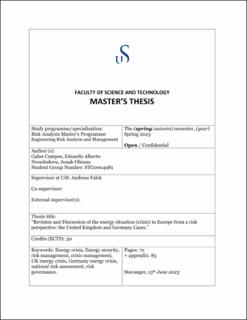| dc.description.abstract | The energy crisis has been a topic of great concern for the global community. It is characterized by the volatility of energy prices, the increasing demand for energy, and the need to reduce greenhouse gas emissions. Europe has been facing an energy crisis that has threatened the region's economic stability and security. Energy security is a critical issue for the European Union, as it is highly dependent on imported energy resources. According to the European Commission, around 53% of energy consumption in the EU is imported, with the dependency expected to rise to 73% by 2030 (European Commission, 2018). The United Kingdom and Germany are among the largest energy consumers in Europe, and their energy policies and energy mix have significant implications for the region's energy security. This thesis, titled "Revision and Discussion of the Energy Situation (Crisis) in Europe from a Risk Perspective: United Kingdom and Germany Cases," delves into the energy challenges faced by Europe, with a particular focus on the United Kingdom and Germany. The study through the definition of five research questions delves into the strategies the UK and Germany have been using to manage the current energy crisis. Authors choose a qualitative methodology approach through the scoping of different publications such as papers, books, reports, National Regulatory Authorities (NRAs), and government crisis management plans. Theoretical basis are presented on the Risk Management and Governance domain which is later compared to the theoretical findings on the risk and crisis management practices the European Union, the United Kingdom and Germany have implemented or are currently effective. The analysis section them present the results and expand on each country specific cases. The United Kingdom's energy policy is shaped by its commitment to reducing greenhouse gas emissions and its desire to maintain energy security. The country's energy mix comprises natural gas, oil, coal, nuclear, and renewable energy sources. Germany's energy policy is also shaped by its commitment to reduce greenhouse gas emissions and it is facing challenges meeting its energy demand. The country has set ambitious targets for renewable energy, and it has closed all its nuclear power plants. However, the transition to a low-carbon energy system has also increased Germany's reliance on imported energy resources, raising concerns about the country's energy security. As part of the conclusions, some points are discussed as follow: The UK and Germany have developed toolboxes which provides key definitions, methodologies, suggestions, and examples on how to carry risk assessments. These documents are based on the EU regulations as part of treaties signed among all the countries participating in the commission. European countries in general seems to agree that all risk assessment and management methodologies as per EU commission recommendations should be based in ISO 31010. This is the case also for the UK where the BIS (British institute of Standardisation) agrees in the same. As a general conclusion this study present that even though national risk assessments and plan have been in place, some of the analysis lacked on the resilience and the likelihood of the risk events to occur. | |
